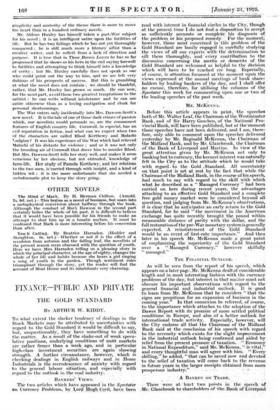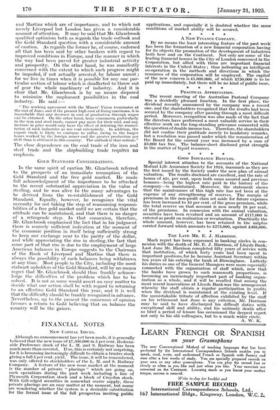FINANCE - PUBLIC AND PRIVATE To what extent the slacker tendency of
dealings in the Stock Markets may be attributed to uncertainties with regard to the Gold Standard it would be difficult to say, but, unquestionably, they have something to do with the matter. As a result of the shake-out of weak specu- lative positions, underlying conditions 'of most markets are rather firmer than a week ago, and in particular high-class investment securities are- again showing strength. A further circumstance, .howeyer, which is checking dealings in English railways and in Home Industrials is the recrudescence of anxiety with regard to the general labour situation, and especially with ,regard to the outlook in the coal industry. • - • - • BANKERS' VIEWS.' _ •- - The two articles which have .appeared in the Spectator on Currency Problems, by Lord Hugh Cecil; have been read with interest hi financial eireteg in the-City; though at the present time I do not-find- a disposition to accept as sufficiently accurate or complete his diagnosis of the problem or his:proposed remedy. For the -moment; however, those most concerned- in this problem of the Gold Standard• are busily engaged in carefully studying the views of all- our experts with-the determination to sift them thoroughly, and eVery contribution to the discussion concerning the merits- or demerits of the Gold Standard are welcomed as helpful- to the decision which will have to be reached ere long. Especially, of course, is attention focussed at the moment upon the views expressed at the annual meetings of hank- share- holders by leading bankers of the day, and I shall offer no excuse, therefore, for utilising the coluirins of the Spectator this week for commenting upon one or two of the leading speeches of the past week. • • MCKF.NNA.
Before this article - appears -in print, the speeches both of Mr. Walter Leaf, the Chairman of the Westminster Bank, and of Sir Harry Goschen, of the Nationid Pro- vincial Bank, will have been published, but at theltioment those speeches have not been delivered, -and I am, there- fore, only able to comment upon the speeches delivered yesterday by Mr. Reginald McKenna; the Chairman of the Midland Bank, and by Mr. Glazebrook, the Chairman of the Bank of Liverpool and Martins. In view of •the great attention given' by Mr. McKenna lint only to banking but to currency, the keenest interest was naturally felt in the City as_ to the attitude which he would take with regard- to the Gold ,Standard. All uncertainty on that point is set at rest by the fact that while the Chairman of the Midland Bank, in the eourse of-his-speech, had much to, say with regard to the -skill• with which what he described as a " Managed Currency " -had been carried on here during recent years, the advantages attaching to an effective Gold Standard and a complete free gold money market were he considered beyond all question, and judging from Mr. McKenna's 'observations, it is clear that he anticipates an early return to the Gold Standard, for he said " the movement in the American exchange has quite recently brought the pound within measurable distance- of parity with the dollar, and the full restoration of the pre-War monetary system is generally expected. ' A reinstatement of the Gad Standard would be an event Of first-rate importance." And then later in his speech Mr. McKenna made a great paint of emphasizing the superiority of the Geld Standard over a " Managed Currency," however skilfully " managed."
THE FINANCIAL OUTLCOK.
As will be seen from the report of his speech, which appears on a later page, Mr. McKenna dealt at considerable length and in most interesting fashion with the currency problems of the day, but interest in that matter must not obscure his important observations with regard to the general financial and industrial outlook— It is -good to learn from Mr. McKenna that he considers " that the signs are propitious for an expansion of business in the coming year.' In that connexion he referred; of course, to the importance which attaches to the adoption of the Dawes Report with its promise of more settled political conditions in Europe, and also of a better outloOk for international trade activity. Especially, however, will the City endorse all that the Chairman of the Midland Bank said at the conclusion of his speech with regard to the necessity--which exists for the slight improvement in the industrial outlook being Confirmed and aided by relief from the present pressure of taxation. " Economy in National Expenditure," said Mr. McKenna, " is vital," and every thoughtful man will agree with him. "-Every shilling," he added, " that can be saved now and devoted to the relief of taxation will come back to the revenue in future years in the larger receipts obtained from more prosperous industry." - A BANKEP. ON TRADE.
There were at least two points in the speech of Glazebrook to shareholders of-the_ Bank of Liverpool and Martins which are of importance, and to which not merely Liverpool but London has given a considerable amount of attention. It may be said that Mr. Glazebrook qualified optimism both as regards .the trade outlook and the Gold Standard question with a considerable amount of caution. As regards the former he, of course, endorsed all that has been said by other bankers with regard to improved conditions in Europe, and the manner in which the way had been paved for greater industrial activity and prosperity. On the other hand, he was manifestly concerned with the extent to which such progress might be impeded, if not actually arrested, by labour unrest ; for we live in times when it is possible for any one par- ticular section of labour which is disaffected to throw out of gear the whole machinery of industry. And it is clear that Mr. Glazebrook is by no means disposed to minimize the unpleasant possibilities in the coal industry. He said :- " The working agreement with the Miners' Union terminates at the end of June, and if the present high cost of living continues, it is. improbable that any decrease in cost of production through wages can be obtained. On the other hand, large consumers, particularly in the iron and steel trade, cannot pay more for their coal, and any increase in price would only have the effect of deferring the resusci- tation of such industries as use coal extensively. In addition, the export trade is likely to continue to suffer, owing to the longer hours worked by tho foreign miner and the greater production per shift than is obtained in this country. The outlook is thus serious."
The close dependence on the coal trade of the iron and steel trade and the shipbuilding trade requires no emphasis.
GOLD STANDARD CONSIDERATIONS.
In the same spirit of caution Mr. Glazebrook referred to the prospects of an immediate resumption of the Gold Standard and the free gold market. He made full acknowledgment of the importance to be attached to the recent substantial appreciation in the value of sterling, and he was alive to the many advantages to be derived from the re-establishment of the Gold Standard. Equally, however, he recognizes the vital necessity for not taking the step of reassuming responsi- bilities of a free gold market until we are certain that the attitude can be maintained, and that there is no danger of a retrograde step. In that connexion, therefore, Mr. Glazebrook emphasised the fact that in his judgment there is scarcely sufficient indication at the moment of the economic position in itself being sufficiently strong to keep our exchange near to the parity of the dollar, and while appreciating the rise in sterling, the fact that some part- of that rise is due to the employment of large American balances in Europe suggests to the Chairman of the Bank of Liverpool and Martins that there is always the possibility of such balances being withdrawn at any time. Most people in the City, including the most stalwart upholders of the Gold Standard, will by no means regret that Mr. Glazebrook should thus frankly acknow- ledge the difficulties of the problem which has to be solved. It is not as some would assert an easy matter to decide what our action shall be with regard to returning to an effective Gold Standard this year, and it is well that the difficulty should be frankly recognized in advance.. Nevertheless, up to the present the consensus of opinion favours a return to Gold believing that on balance the country will be the gainer.















































 Previous page
Previous page